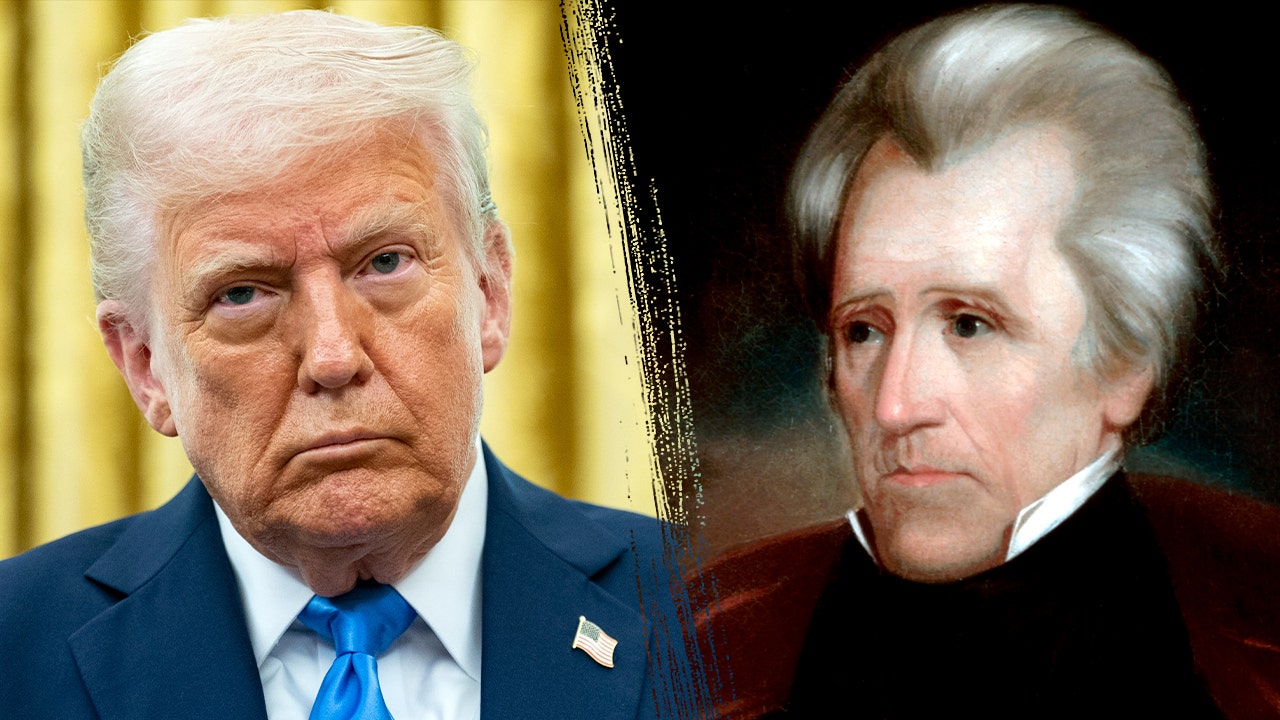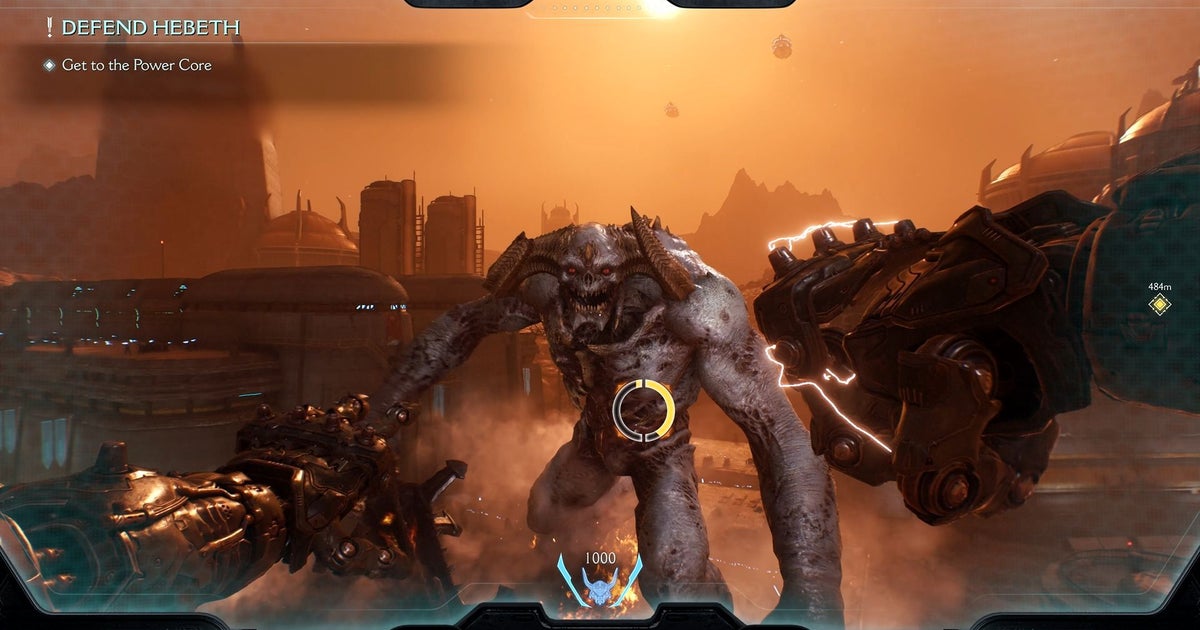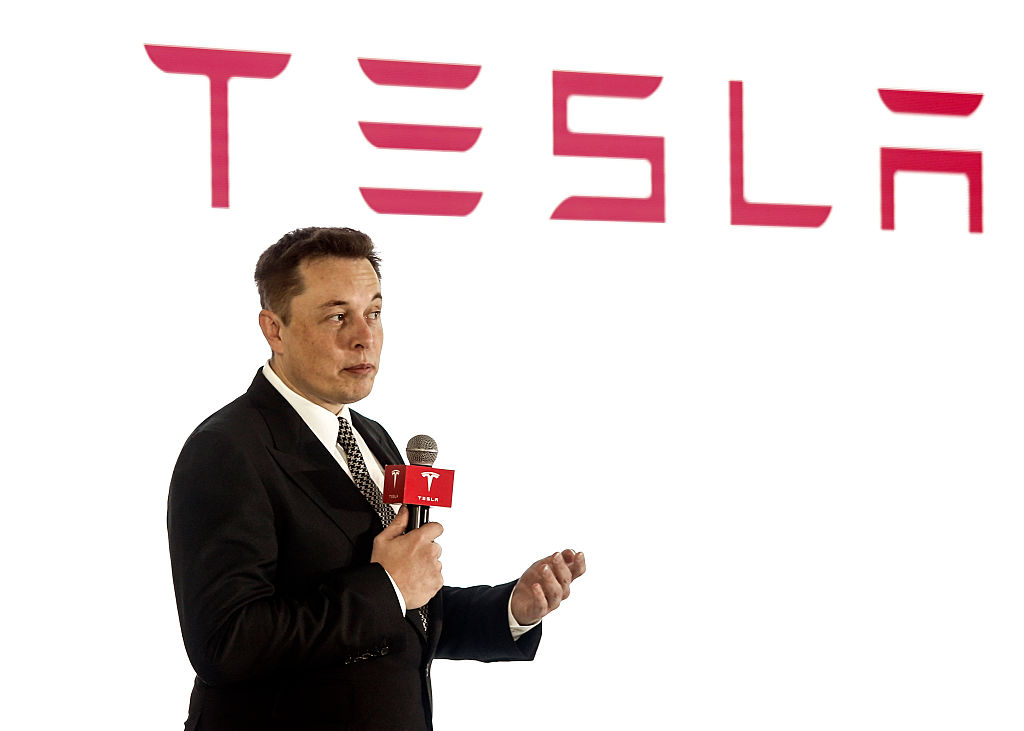“I strongly feel that this is an insult to life itself.” -Hayao Miyazaki, on AI tools.
Miyazaki’s AI criticism is largely limited to a handful of comments from a single video clip, but it’s enough to make the Studio Ghibli co-founder one of the most famous AI skeptics in the canon. In the 8 year-old clip, Miyazaki is presented with a crude AI demo displaying a zombie-like figure that has ‘learned’ to walk. Miyazaki, who, as the director of Spirited Away, My Neighbor Totoro, and Princess Mononoke, stakes a solid claim to the world’s best-loved and most acclaimed living animator, is both thoughtful and ruthless in communicating his revulsion.
“Every morning, not in recent days, I see my friend who has a disability,” Miyazaki begins. “It’s so hard for him just to do a high five. His arm with stiff muscle can’t reach out to my hand. Now, thinking of him, I can’t watch this stuff and find it interesting. Whoever creates this stuff has no idea what pain is.” He does not stop there. “I am utterly disgusted. I would never wish to incorporate this technology into my work at all. I strongly feel that this is an insult to life itself.”
An insult to life itself! You can’t get much more forceful than that! As a result, the quote has gone viral time and again over the last two and half years as the generative AI boom has continued. It’s omnipresent, at least in the online critical discourse about art and AI, where it’s pretty much a core part of the ambient cultural consideration of AI-generated output.
Enter OpenAI. Earlier this week, OpenAI launched its new image generation feature, which is integrated directly into ChatGPT and allows users to input more complex instructions for editing and organizing the presentation of the output. The first big viral trend to come out of the new service was users turning photos of family vacations, historical events, and pop cultural images into animated stills in the style of Studio Ghibli films. (The whole thing was a bit of a throwback to the heady days of 2023 when you would see AI influencers sharing photos of famous figures in the style of Wes Anderson films or whatever.) ChatGPT let users “Ghibilify” the images, so we got Ghiblified Hawk Tuah girl, Ghiblified Elon Musk (obviously), and so on.
The issue here should be obvious. I won’t pretend to know exactly how Miyazaki thinks about modern generative AI systems—the tool he was commenting on was a cruder prototype—though one might venture to argue that he’d feel even more strongly about tools that further automate human art with greater ease, and often drive it further into the uncanny valley. Regardless, the man on record with likely the strongest and bluntest disavowal of using AI tools for art, is now the same man whose notoriously painstakingly handcrafted art is being giddily automated by ChatGPT users for what amounts to a promotional campaign for a tech company that’s on the verge of being valued at $300 billion.
Sam Altman, OpenAI’s CEO, not only participated, changing his X avatar to a ‘Ghiblified’ self portrait, but insisted that this was the plan all along.
Which in turn raises the specter of copyright infringement. Speaking to TechCrunch, a copyright lawyer very diplomatically said that while it’s unlikely infringement to produce images in the style of a studio, it’s “entirely plausible” that OpenAI’s models were trained on millions of frames of Ghibli films. He noted that it’s still an open question whether or not that in fact violates current IP law, or constitutes fair use, as the tech companies argue.
On that front, judges recently dealt tech companies a blow, ruling in favor of Thomson Reuters that a pre-ChatGPT AI system was creating images that competed with the original material, and thus was not in fact fair use. OpenAI and Google, meanwhile, are desperately trying to win this battle, appealing to the Trump administration directly, and going so far as to argue that if they’re not allowed to ingest copyrighted works into their training data, China will beat the US in AI.
Now, if—and of course this is a whopping if—OpenAI had consulted Studio Ghibli and its artists on all this, if those artists had consented and say reached a licensing deal before the art and frames from their films were ingested into the training data (as is pretty apparently the case), then look, this would indeed be a bout of generally wholesome fun for everyone involved. Instead, it’s an insult.
(I reached out to OpenAI for comment about all of this, but have not heard back; I’ll update if I do.)
That’s what gets me most about this whole thing. Just about everyone in the AI world knows Miyazaki is adamantly against AI, and they’re doing these memes anyway; or worse, because they know he’d hated it. When I tweeted about Miyazaki’s AI criticism on X, I got—am still getting—lots of replies like ‘who cares what he thinks’ or even ‘Fuck Miyazaki’. Sam Altman certainly knows of Miyazaki’s stand on AI. And he’s encouraging the trend anyway.
For the most adamant of AI advocates, ‘Ghiblification’ is just more proof that they’ve won; that tech has conquered art, and that they can use and commodify it as they please. Who gives a shit how the artists feel about it?
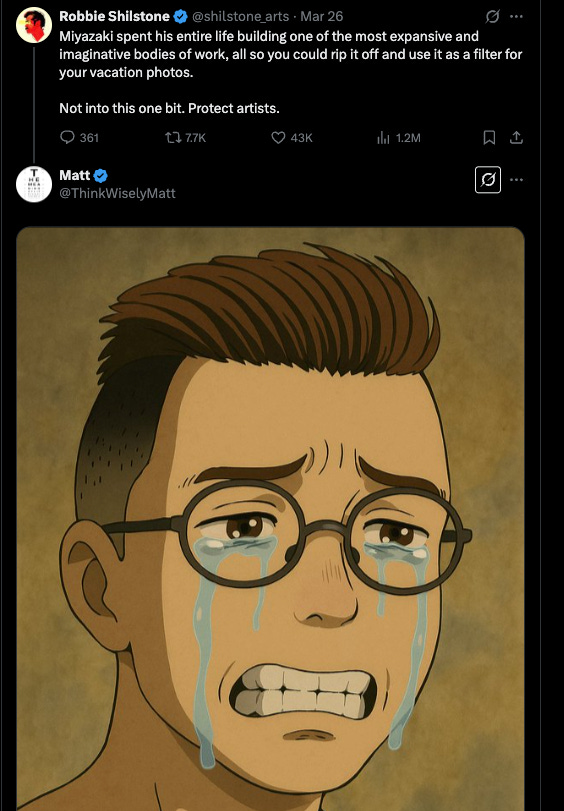
I’ve always been a little skeptical of the line that the AI crowd feels contempt for artists, or that such a sense is particularly widespread—because certainly they all do not!—but it’s hard to take away any other impression from a trend so widely cheered in its halls as AI Ghiblification.
“It’s so frustrating to me, especially because so many of those AI pushers know how Miyazaki feels about it,” the artist Reid Southen, who often speaks about the impacts of AI on the creative industries, told me. “Also, it’s weird to see Sam leaning into it, I feel like it’s pretty irresponsible given the data issues and lawsuits.”
The stakes are higher now, but Altman has not let such concerns bother him for long in the past—this time last year, he was embroiled in another scandal, that time for using a voice that sounded suspiciously like Scarlett Johansson’s in a voice-based AI product explicitly inspired by the film Her, which she starred in.

For tech CEOs, the dystopia is the point
Above and beyond the copyright concerns, Southen laments the impact of, for lack of a better word, ChatGPT’s AI slopifying of Studio Ghibli.
I think one of the worst parts of it is that the styles that get aped the most inevitably end up being devalued and feeling cheap, at no fault of the originals. It’s like how so much of the stuff out there rips off Pixar and DreamWorks stuff to the point where now my knee jerk reaction to seeing those styles is to associate it with slop. It’s kind of an internal battle sometimes when just trying to view things, and it’s extremely sad and worrying to me that the work of a beloved studio like Ghibli is now inextricably tied to slop due to this trend. At a cultural and subconscious level, AI is now eating away at part of what makes Studio Ghibli’s work so special, and that’s not helping art or animation, it’s actively hurting it.
I suppose a silver lining is that to a discerning eye, the actual similarity to Ghibli’s style is superficial at best, and it won’t be long until everyone moves onto the next set of jingling keys.
There is, as one is legally obligated to write in posts like this these days, a lot going on. A viral meme category enabled by an AI company appropriating the work of a beloved animation studio may not seem earth-shaking on its own, given everything else. But OpenAI and the other AI giants are indeed eating away at the livelihoods and dignity of working artists, and this devouring, appropriating, and automation of the production of art, of culture, at a scale truly never seen before, should not be underestimated as a menace—and it is being experienced as such by working artists, right now. Hell, my own work was just revealed by journalists at the Atlantic to have been ingested into Meta’s AI systems—all those books, all that work, and they’re probably in all the other LLM datasets, too—where my writing is doing a small part in helping those companies produce text for profit.
And it’s not, I might underline, a separate phenomenon from all the myriad other efforts to corral and concentrate power into a smaller number of hands, either.
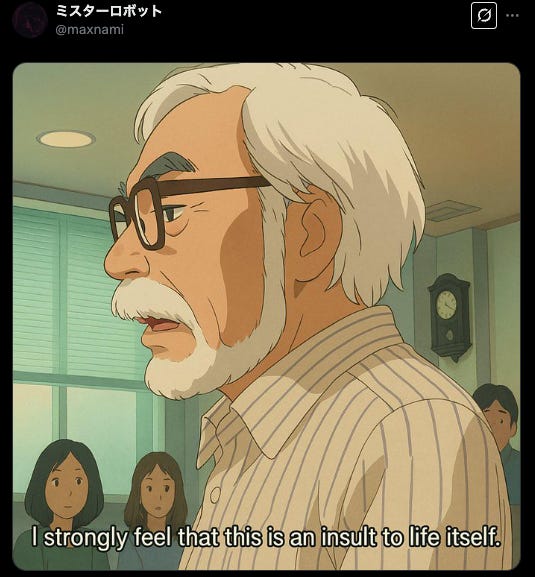
“I feel like we are nearing the end of times,” Miyazaki says at the end of the clip. “We humans are losing faith in ourselves.”
As always, thanks to subscribers for reading, and for paying supporters for making this entirely human-run and human-written enterprise possible. I cannot do it without you; if you can, consider chipping in $6 a month so I can stay on top of Silicon Valley, the tech oligarchy, and the AI industry while, you know, paying rent and feeding the kids and such. Thanks again, I appreciate it deeply.
Oh, and stay tuned for tomorrow, where I’ll be hosting my first subscriber chat on Substack. That’s all for now—hammers up.



